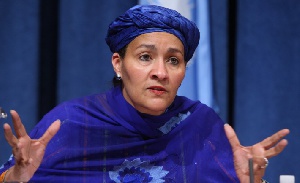 United Nations Deputy Secretary-General Amina Mohammed
United Nations Deputy Secretary-General Amina Mohammed
United Nations Deputy Secretary-General Amina Mohammed on Sunday reiterated the importance of coordinating continental initiatives with the China-proposed Belt and Road Initiative (BRI) to spur infrastructure development across Africa.
She noted the UN' commitment to "working with African institutions to mobilize the resources that will be required for the full implementation of the African Continental Free Trade Area (AfCFTA) Agreement, which officially went into operation here on Sunday, Mohammed also emphasized the need to invest in the infrastructure sector if the continent was to realize the full potential of the AfCFTA.
She stressed the potential of BRI in advancing infrastructure development and regional integration across Africa.
"We will be working with you to coordinate and leverage complementary funding sources, from the African Development Bank's Africa50 Fund to the African Union's Program for Infrastructure Development in Africa, and China's Belt and Road Initiative," Mohammed told African leaders at the opening session of the 12th Extraordinary Summit of the AU Heads of State and Government in Niamey, capital of Niger.
The continental free trade pact "will create jobs and contribute to technology transfer and the development of new skills; it will improve productive capacity and diversification, and it will increase African and foreign investment," she said.
The AfCFTA "will bring the promise of trade-led economic growth closer to reality for Africa's entrepreneurs, industrialists, investors, innovators and service suppliers," Mohammed said.
The pact is "a tool to unleash African innovation, drive growth, transform African economies and contribute to a prosperous, stable and peaceful African continent, as foreseen in both Agenda 2063 and the 2030 Agenda for Sustainable Development," she said.
The African free trade accord was launched on March 21 last year in Kigali, capital of Rwanda.
On Sunday, the AfCFTA's operational phase was officially launched at the extraordinary AU summit. It came into force on May 30, after the deposit of the required minimum of 22 instruments of ratification by AU member-states to the AU Commission.
Five more instruments of ratification have since been deposited, including Gabon and Equatorial Guinea, which deposited their respective instruments on Sunday, bringing the total number of countries that have deposited their AfCFTA ratification to the AU Commission to 27.
Also on Sunday, Nigeria and Benin signed the free trade pact, leaving Eritrea as the only member of the African Union that has not signed onto the historic accord.